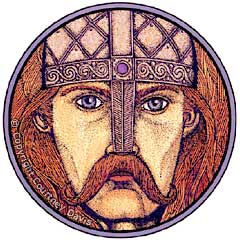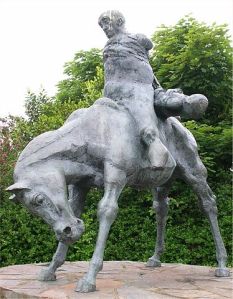“For I too am Efnisien.” The rite closes, each man of us — for this is a men-only event — repeating the words, hands lifting from between our feet the small black cauldrons, and cupping them. They’re warm to the touch still, from when they sat in the central fire-pit. Owning our rage, not looking away from it. Seeing its destructiveness, children and women often its first victims, men themselves its last. Acknowledging the difficult gift of anger, accepting what it might have to teach. Allowing the possibility of transformation, gift of the Goddess whose symbol is the cauldron. Echoes of another country, sun-kissed and prone to earthquakes. Echoes of another story, the same story, permeated with male anger, opening with dark words: “Rage — Goddess, sing the rage of Peleus’ son Achilles, murderous, doomed, that cost the Achaeans countless losses …”*
/|\ /|\ /|\
 The army of Bran is enormous, as if all of Wales has emptied itself and spilled onto the eastern shore of Ireland. The beaches lie dark with men’s shadows. So great is the full extent of their coming that the heart runs out of the Irish, knowing they can never win in open battle. It must be by trickery. So they raise a great house to receive Bran and his men, and the outcome hangs in the balance. Perhaps we can avert war after all, run the rumors, at least among those who don’t know that in the towering new hall, a hundred bags hang from the rafters. And each holds and conceals an Irish warrior. The bulging sacks of coarse cloth supposedly contain merely flour, part of the provisioning for the enemies-turned-guests. A great feast this night, promise the Irish. We will mend this rancor between us.
The army of Bran is enormous, as if all of Wales has emptied itself and spilled onto the eastern shore of Ireland. The beaches lie dark with men’s shadows. So great is the full extent of their coming that the heart runs out of the Irish, knowing they can never win in open battle. It must be by trickery. So they raise a great house to receive Bran and his men, and the outcome hangs in the balance. Perhaps we can avert war after all, run the rumors, at least among those who don’t know that in the towering new hall, a hundred bags hang from the rafters. And each holds and conceals an Irish warrior. The bulging sacks of coarse cloth supposedly contain merely flour, part of the provisioning for the enemies-turned-guests. A great feast this night, promise the Irish. We will mend this rancor between us.
More and still more of the Welsh forces pour into the camp. Among the leaders one stays suspicious. Efnisien, prince, brother of Bran and Branwen. Never an easy man, this twin of gentle Nisien. The muscles ripple beneath his shoulders, and his hands twitch. Do nothing, brother, till I return, he finally mutters to Bran, and stalks off scowling to reconnoiter the hall. The last of the Welsh have finally joined the main body of warriors when Efnisien returns. His hands and torso drip now with blood, and a fierce grin splits his face. Dead now, he says, exulting. Scores of them, waiting to fall on us at the feast. He has crushed upwards of a hundred Irish skulls like walnuts. His eyes glow with it.
The second part of the Irish plan for the night, the feast, still proceeds on schedule. In the center of the hall a great fire burns, the andirons orange in the heat. In the flickering glow, a hall full of warriors whose armbands and bracelets throw back the light, a glitter of silver, jewels and red gold. No more room indoors, men find a place outside. Under torchlight they mingle and stare at each other. Amid the roasts and savories, the mead and forced cheer along the benches, the Irish plot is a whisper that will not die, that no one admits to hearing. A call for everyone’s attention, and Gwern, the young prince and heir, child of Matholwch and Branwen, is presented. Here is one path to peace, a child who unites the two nations in his own flesh. Bran makes much of him. Nephew, sister’s son, certain blood kin, a hallowed relationship since time out of mind. But Bran also gazes at his sister sitting beside his brother-in-law Matholwch, notes the painful thinness of her figure, the faint yellow of old bruises on her skin, a tightness around her mouth that does not go away. Their eyes meet again and again, and they need no words to speak whole histories to each other. Well, brother? says her look. I have come, says his.
The feast does no good, even if either side wished it. The Irish, their plot foiled, are touchy, all nerves, and warriors on both sides take every feasting jest the worst way. Tempers run high, spiked with strong drink, and a scuffle breaks out, unsurprisingly, around Efnisien. It spreads, and in the reckless fighting, Gwern, the shining prince, gets thrown into the massive firepit.** By Efnisien. His and Bran’s nephew, Branwen’s boy.
At this, both sides drop all pretense. The fighting spreads, ferocious. The Irish just keep coming, endlessly, until Efnisien spies the magic cauldron, the gift of Bran for the now accursed wedding between Welsh and Irish royals. Matholwch’s men have turned it to good purpose, deploying it to revive their fallen fighters. What use, what hope is it to kill men who don’t stay dead?!
Efnisien shakes his head to clear away some of the battle lust. Think! he commands himself. The red fog that clouds his mind thins briefly. And then he’s got it, a way forward. He flings away his own sword, grabbing one of Irish make, and throws himself among the Irish corpses awaiting resurrection. He lies still as he can, trying to slow his heavy breathing. The cauldron itself must go. Soon enough, as he foresaw, the Irish don’t stop to pick and choose, but toss each Irish corpse into the cauldron, hurrying on to the next. From the depths of the magic vessel comes a deep hum. Steam rises from it, along with a roar of distant voices that shakes its sides.
Efnisien feels himself lifted, then dropped. How long he seems to fall! Then a sudden heat hugs him, burning along each nerve and vein. Everywhere his skin seems to melt into agony. The death-destroying power of the cauldron — but he is already alive! With a last surge of strength, he somehow finds his feet, shoving his arms out to both sides, the cauldron a scalding quicksilver fury against palms and soles. He heaves hard, harder. The cauldron, and Efnisien too, shrieks, cracks and shatters. Then blackness.
/|\ /|\ /|\
How many others can be dead, and none matter but two? Bran thinks. Gwern lost, and his sister Branwen all but dead from grief. On all sides, heap upon heap of bodies lies. The Irish who had assembled against them? All slain. And the endless army of the Welsh? Of those lines and squads and battalions of men who crossed the Irish Sea with him, just seven survive.
Part Four recounts the return of the Seven to Wales.
/|\ /|\ /|\
*Fagles, Robert. The Iliad. Penguin Classics, 1999.
**This act of Efnisien’s is explained by one source as “avoiding the geas against shedding kinsmen’s blood.”
Images: Courtney Davis/jmasonart; Brand and Gwern.
Edited and updated 21 Feb 2014

